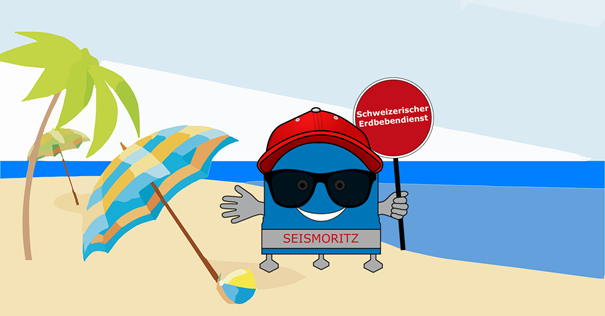2018-07-18
Ready to head off for holiday... to an earthquake country?
The summer holidays are here at last. The accommodation is booked, the bags are packed and you're through airport security. What could possibly go wrong now? Many travellers are well prepared for holiday woes in the form of mosquito infestations, pickpockets or tropical heat. They have their mosquito spray to hand, took out insurance before they left and have booked an air-conditioned room. As for earthquakes, few would give them a second thought. Yet an earthquake, though much less common than the problems mentioned above, could seriously sour the holiday mood.
As with anything else, taking a few simple precautions could make all the difference. Before setting off, find out if your destination is in an area particularly prone to earthquakes (see Earthquake zones). Several of our most popular summer destinations, including Italy, Greece and Turkey, are in regions with a much higher earthquake risk than Switzerland. Other favourite destinations such as New Zealand, California and Bali are located along the Ring of Fire, a highly seismically active area where 90% of all earthquakes occur. If you are travelling to one of these areas, it may be worth taking on board the following tips.
Read more...As earthquakes occur without warning, it helps to know in advance what you should do if one does happen. The standard recommendation in Switzerland and elsewhere is: seek cover. That might be under a sturdy table or by holding a pillow over your head in bed. Many earthquake injuries are caused by falling objects such as shelf contents or ceiling or wall materials. If you run around in a panic during the quake, you are more likely to be hit by such objects. What's more, even keeping your balance can be difficult during a powerful earthquake, so you'll probably want to cling on to something that offers protection (the Director of the Seismological Service found this out for himself, as you can see in the next episode of Einstein to be broadcast on SRF).
However, as so often, there are exceptions to this rule. If you're near the sea, running inland is a better option due to the possibility of a subsequent tsunami. In Alaska, they have the following rule of thumb: if the quake is strong enough to almost knock you over, run up the nearest hill. Likewise, if you are indoors but very close to an exit, head outside. If you're already outside, stay there and keep away from buildings. Detailed recommendations on what to do can be found here. Essentially, the right action to take during an earthquake very much depends on the circumstances (the type of earthquake, the type of building, where you are, and so on).
This makes it difficult for seismologists to give general recommendations without causing undue anxiety. The most important protection against earthquakes is and will always be appropriate construction. However, judging how earthquake-resistant a building is just by looking at it is hard even for experts, so this is probably not something that you can take into account when choosing accommodation. That said, it's often the case that the newer a building is, the more likely it is to comply with the latest building standards and therefore to be earthquake-resistant.
Once the tremors are over, heavily damaged buildings should be evacuated. While making your way outside, beware of falling objects such as bricks and tiles or disconnected power lines. Aftershocks, some of them strong, are likely to occur after a major quake, and these may cause further damage. In genaral, always follow the instructions of the local authorities.
Should you wish to take further precautions, this page lists recommendations for things you can do ahead of shorter or longer trips. All the information can also be downloaded as a fact sheet.
Last but not least, don't forget that, while earthquakes are real, the risk of being harmed by one is extremely small, even in seismically active areas. For example, if you're travelling to California, the risk is 1 in 1,000,0000 per year. Driving a car there is much more dangerous, with around a 1 in 11,428 chance of being involved in a serious accident. So the message is: make a few simple preparations and then enjoy your well-deserved holidays!
